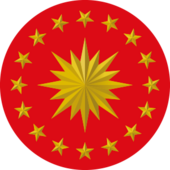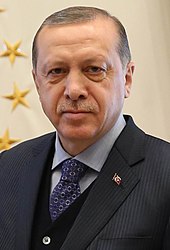President of the Republic of Turkey
| President of the Republic of Turkey | |

|
|
| President's emblem | |

|
|
| Standard of the President | |

|
|
|
Acting President Recep Tayyip Erdoğan |
|

|
|
| Official seat | since 2014 Cumhurbaşkanlığı Sarayı, formerly Çankaya Palace in Ankara |
| Term of office | 5 years (re-election possible once) |
| Creation of office | October 29, 1923 |
| Last choice | June 24, 2018 |
| Salutation | Sayın Cumhurbaşkanı |
| Deputy | Vice President |
| website | www.tccb.gov.tr |
The President of the Republic ( Turkish : Cumhurbaşkanı ) is the head of state and the head of government of the Republic of Turkey . Current incumbent is since August 28, 2014 , Recep Tayyip Erdogan , who on 24 June 2018 a new Constitution with strongly elevated privileges reelected was.
The changes to the Turkish constitution have not yet been taken into account in the text below; Information on this in the article Constitutional referendum in Turkey 2017 .
Constitutional position
According to the current 1982 constitution , the president of the republic is the head of the state (devletin başı) . He represents the Republic of Turkey and the unity of the Turkish nation. He also oversees the correct application of the Constitution and the orderly and harmonious functioning of the state organs.
Competencies
The President has the following powers and duties:
- proclaims the laws passed by parliament
- can call a referendum on laws that contain provisions that amend the constitution
- can bring an action for annulment before the Constitutional Court against laws or regulations that could violate the constitution
- decides on the holding of early elections to the national parliament
- sends diplomatic representatives abroad
- receives diplomatic representatives from abroad
- ratifies and promulgates international treaties
- can exercise supreme command over the armed forces of the country on behalf of parliament
- decides (to a limited extent) on the use of the Turkish armed forces
- appoints the chief of staff
- can convene the National Security Council
- chairs the National Security Council
- can impose a state of emergency by resolution and issue ordinances with the force of law
- can issue decrees
- can reduce or waive penalties for certain persons for reasons of permanent illness, disability and age
- appoints the members and the chairman of the State Control Council
- may initiate investigations, investigations and controls by the State Control Council
- appoints the members of the university council
- appoints the university rectors
- appoints 12 of the 15 members of the Constitutional Court
- elects a quarter of the members of the State Council
choice
Electoral process
Indirect election (1982-2014)
Since the 1982 constitution came into force, the President has been elected by secret ballot by the Grand National Assembly for a term of seven years. Re-election was not possible. Elected was someone who was able to get at least two thirds of the total votes. The election commenced thirty days prior to the end of the presidential term or ten days after the presidency became vacant and completed within thirty days of the date on which the election began. The names of the candidates had to be communicated to the Parliament's Bureau within the first ten days.
If the required two-thirds majority of the number of MPs was not achieved in the first and second ballots , a third voting round had to take place. In this third round of voting, only a simple majority of the number of MPs was needed for a candidate to be elected president. Should the required majority not be achieved in the third round of voting either, a fourth ballot - a runoff between the two candidates with the most votes - had to be held. If the required simple majority was also not achieved in this voting round, new parliamentary elections had to take place immediately.
Direct election (from 2014)
As of 2014, the president will be directly elected by the people for a term of five years. Re-election is possible once. The election is carried out within sixty days before the end of the term of office or, if the office is vacant for other reasons, within sixty days after the vacancy occurs.
The candidate who receives an absolute majority of the votes cast is considered elected. If none of the candidates achieve the required majority, a runoff election will be held on the second Sunday after the election day between the two candidates who received the most votes in the first ballot. The person who can collect the most votes is then considered elected.
If a candidate is canceled before the second ballot due to death or loss of the eligibility to vote, the candidate who received the next highest number of votes in the first ballot will stand. If only one candidate remains for the second ballot, this vote takes place in the form of a referendum.
requirements
Anyone who is a member of parliament, has reached the age of forty and has completed university education, or a Turkish citizen with the same characteristics and the possible eligibility for election as a member of parliament can be nominated as a candidate. In addition, a candidate needs a written proposal from at least twenty members of parliament. Parties that achieved at least ten percent of the vote in the last parliamentary election can also designate a joint candidate.
Requirements for taking office
Who the president elected was and a member of a party is, according to Article 101 should break off relations with his / her party and the oath of office to the office under Article 103 before Parliament.
Swearing in
To take office, the new President of the Republic is sworn in before the Grand National Assembly. The oath is according to Article 103 of the Constitution.:
" Cumhurbaşkanı sıfatıyla, Devletin varlığı ve bağımsızlığını, vatanın ve milletin bölünmez bütünlüğünü, milletin kayıtsız ve şartsız egemenliğini koruyacağıma, Anayasaya, hukukun üstünlüğüne, demokrasiye, Atatürk ilke ve inkılâplarına ve LAIK Cumhuriyet ilkesine bağlı kalacağıma, milletin huzur ve refahı Milli Dayanisma ve adalet anlayışı içinde herkesin insan haklarından ve temel hürriyetlerinden yararlanması ülküsünden ayrılmayacağıma, Türkiye Cumhuriyetinin San ve şerefini korumak, yüceltmek ve üzerime aldığım görevi tarafsızlıkla yerine getirmek için bütün gücümle çalışacağıma Büyük Türk Milleti ve tarih huzurunda, namusum ve şerefim üzerine andiçerim. ”
“I swear before the Great Turkish Nation and history, with my honor and dignity, that in my capacity as President of the Republic I will protect the existence and independence of the state, the indivisible unity of fatherland and nation, the unrestricted and unconditional sovereignty of the nation will remain connected to the constitution, the primacy of law, democracy, Ataturk's principles and reforms and the principle of the secular republic, from the ideal that in the spirit of the well-being of the nation, national solidarity and justice, everyone should I will enjoy human rights and fundamental freedoms, will not deviate, will endeavor with all my might to protect and increase the fame and honor of the Republic of Turkey and to carry out the office which I have assumed impartially. "
stand-in
If the President is unable to exercise his office for reasons such as illness or traveling abroad, he will be represented in office by his Vice-President.
Should the office of president become vacant in the event of death, resignation or for any other reason , the vice president takes over the office of the president until a new election is held.
responsibility
All decisions of the President, which must be signed by the Prime Minister and the relevant ministers, are the responsibility of the person signing.
On the proposal of at least one third of the Members of Parliament and with the subsequent resolution of at least three quarters of the Members, the President can be accused of treason.
Official seat
Cumhurbaşkanlığı Sarayı on the premises of Ataturk Orman Çiftliği in Ankara has been the official seat since 2014 .
See also
Web links
- Official website of the President of Turkey (Turkish, English)
- Constitution of the Republic of Turkey (as of May 10, 2007) www.verfassungen.eu (German)
- Constitution of the Republic of Turkey (as of January 1, 2012) Turkish law , PDF document (German)
Individual evidence
- ↑ "If the President-elect is a member of a party, his / her relationship with his party shall be severed and his / her membership of the Grand National Assembly of Turkey shall cease.", See Constitution of Turkey (in English) , from https://global.tbmm.gov.tr , accessed July 26, 2015
- ^ Translation by Christian Rumpf: The constitution of the Republic of Turkey. As of January 1, 2012 ( PDF file; 658 KB ).
